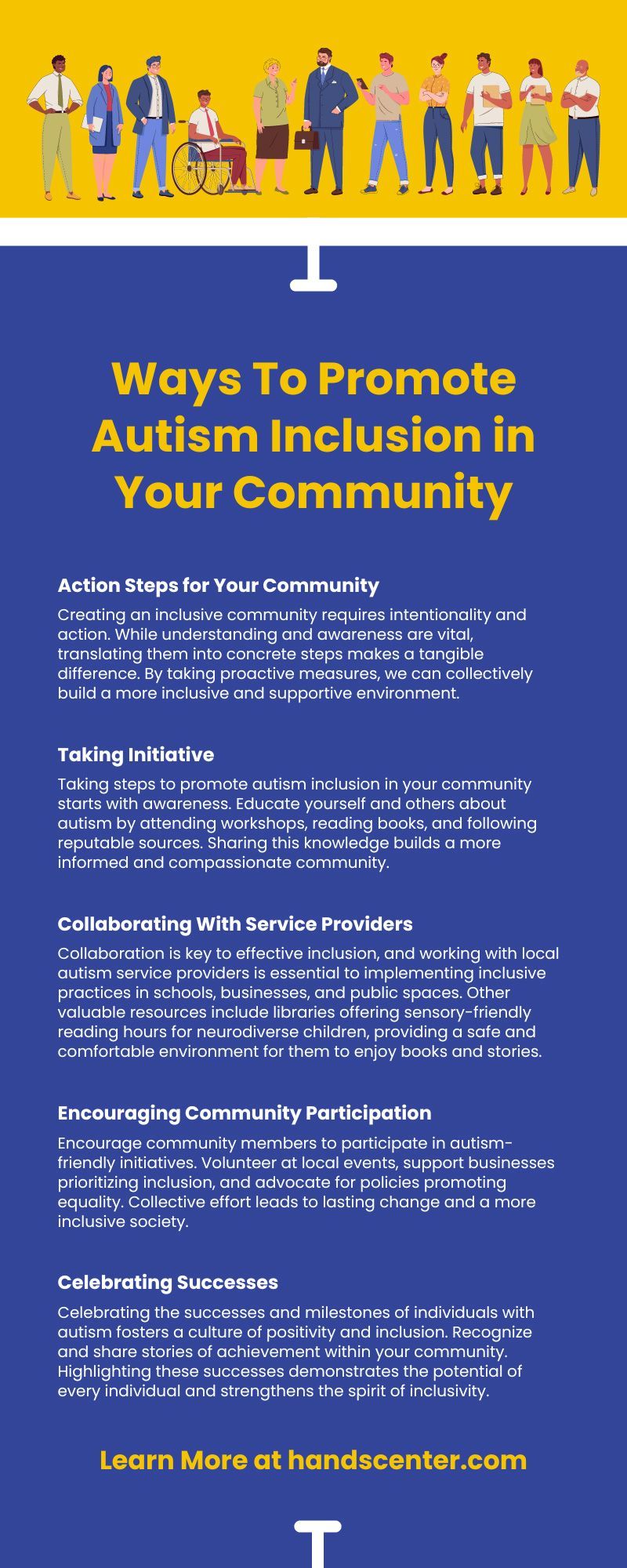Ways To Promote Autism Inclusion in Your Community
Autism is a diverse and unique neurodevelopmental condition that shapes the way individuals communicate, interact, and process information. Each person on the autism spectrum has their strengths and challenges, making every experience distinctly personal. This diversity highlights the importance of promoting autism inclusion in our communities.
We can create a more compassionate and understanding society by fostering environments where everyone feels accepted and valued. This means actively promoting inclusivity, celebrating diversity, and lifting marginalized voices. When individuals feel appreciated and understood, it benefits their well-being and strengthens our community, paving the way for a brighter and more harmonious future.
Here are a few ways to promote autism inclusivity in your community.
Creating Inclusive Spaces
Creating spaces that welcome everyone is essential for autism inclusion. Many individuals with autism have heightened sensitivity to lights, sounds, and textures. Educational and public areas should accommodate various needs to ensure they’re comfortable. For instance, libraries and community centers can offer sensory-friendly rooms with soft lighting and calming activities.
Sensory-friendly design plays a crucial role in making environments more inclusive. Using neutral colors, avoiding harsh lighting, and incorporating sound-absorbing materials can make spaces more comfortable. Additionally, offering noise-canceling headphones or tactile objects can help individuals manage sensory overload.
Accommodating Diverse Communication Styles
Effective communication is key to inclusion. People with autism may communicate differently, using verbal, non-verbal, or assisted methods. Providing visual aids, sign language interpreters, and communication boards can facilitate better interaction. Training staff and community members to recognize and respect these diverse communication styles is equally important.
Building Inclusive Communities
Inclusivity is key to a thriving community. By understanding and meeting the needs of people with autism, we create a fairer society. Adapting our public spaces, communication, and social interactions to diverse neurological profiles benefits everyone and enriches the whole community. But how can the community members help?
Role of Community Leaders
Community leaders have a significant influence on fostering inclusive environments. They can advocate for autism-friendly policies and practices within local governments and organizations. Encourage your leaders to help dismantle stereotypes and uplift acceptance by promoting awareness and understanding.
Events and Initiatives
Community events and initiatives play a pivotal role in promoting understanding and acceptance. Organizing autism-friendly events, such as sensory-friendly movie screenings or quiet hours at amusement parks, allows individuals with autism to participate comfortably. These events also educate the broader community about autism, fostering empathy and acceptance.
Supporting Families
Families play a central role in the lives of individuals with autism, providing essential support and advocacy. However, they often face unique challenges that require additional resources and assistance.
By offering robust support systems, educational resources, and community engagement, we can empower families and ensure their loved ones with autism thrive. Here are some ways to foster a more supportive environment for families.
Challenges Faced by Families
Families of those with autism often face unique challenges. Navigating education systems, accessing health care, and finding suitable social activities can be overwhelming. Providing these families with the necessary support and resources is vital to their well-being and inclusion.
Support Networks
Building strong support networks is crucial for families. Local support groups offer a sense of community and shared experience in person and online. These groups provide emotional support, practical advice, and a platform for advocacy. Schools and community centers can facilitate the formation of these networks, ensuring families have access to them.
Available Resources
Numerous resources are available to support families. Government programs, non-profit organizations, and autism service providers offer services ranging from therapy to educational support. Providing families with information about these resources can help them access the assistance they need to thrive.
The Role of Educators and Service Providers
Educators play a crucial role in promoting autism inclusion by adopting inclusive teaching practices, which ensure all students receive a quality education. Effective strategies such as differentiated instruction, individualized education plans (IEPs), and collaboration with special education staff support students with autism.
By working together, autism service providers and educators can enhance support within educational settings. Regular training on autism awareness equips teachers with the knowledge needed to create inclusive classrooms while collaborating with service providers, allowing for the integration of specialized therapies and interventions tailored to each student’s needs.
Equally important is promoting understanding among peers. Educators can incorporate lessons on diversity and acceptance into their curricula, encouraging students to celebrate differences. This fosters a culture of kindness and empathy, benefiting all children.
Action Steps for Your Community
Creating an inclusive community requires intentionality and action. While understanding and awareness are vital, translating them into concrete steps makes a tangible difference. By taking proactive measures, we can collectively build a more inclusive and supportive environment.
Taking Initiative
Taking steps to promote autism inclusion in your community starts with awareness. Educate yourself and others about autism by attending workshops, reading books, and following reputable sources. Sharing this knowledge builds a more informed and compassionate community.
Collaborating With Service Providers
Collaboration is key to effective inclusion, and working with local autism service providers is essential to implementing inclusive practices in schools, businesses, and public spaces. Other valuable resources include libraries offering sensory-friendly reading hours for neurodiverse children, providing a safe and comfortable environment for them to enjoy books and stories.
Businesses can create inclusive environments by offering dimmable lights, lower music volume, and special sections for families. There are certified autism-friendly businesses committed to these practices, helping those with sensory sensitivities feel welcome. These practices foster a more inclusive society and benefit businesses by attracting more customers and promoting loyalty.
Encouraging Community Participation
Encourage community members to participate in autism-friendly initiatives. Volunteer at local events, support businesses prioritizing inclusion, and advocate for policies promoting equality. Collective effort leads to lasting change and a more inclusive society.
Celebrating Successes
Celebrating the successes and milestones of individuals with autism fosters a culture of positivity and inclusion. Recognize and share stories of achievement within your community. Highlighting these successes demonstrates the potential of every individual and strengthens the spirit of inclusivity.
Moving Forward With Purpose
Promoting autism inclusion within your community is necessary to build a society that values every individual’s unique contributions. By creating inclusive spaces, supporting families, and collaborating with educators and autism service providers, we pave the way for a brighter future for all.
To further your efforts, consider reaching out to the HANDS Center. Their expertise in supporting individuals with autism can provide valuable insights and resources for your community initiatives. Together, we can make a difference—one step at a time.








